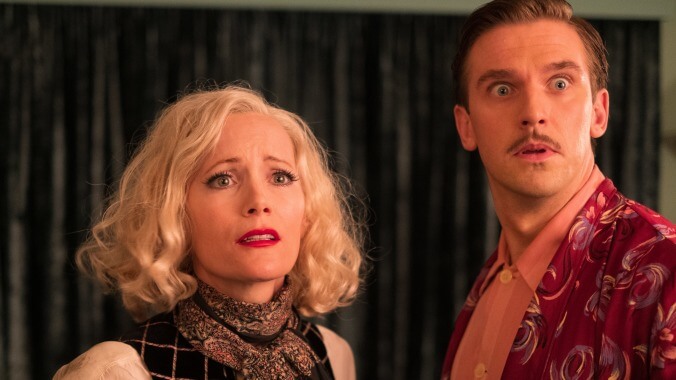The star-studded Noël Coward adaptation Blithe Spirit fails to enchant


Note: The writer of this review watched Blithe Spirit on a digital screener from home. Before making the decision to see it—or any other film—in a movie theater, please consider the health risks involved. Here’s an interview on the matter with scientific experts.
“Would you like a cocktail?” one character asks another in Noël Coward’s famed drawing room comedy of manners Blithe Spirit. “If it’s a dry Martini, yes,” she responds. “If it’s a concoction, no. Experience has taught me to be wary of concoctions.” Coward’s original text is the driest of martinis, a supernatural comedy that gets away with its flippant attitude toward death because none of its narcissistic upper-crust British characters are particularly sympathetic. In contrast, director Edward Hall’s new star-studded big-screen adaptation is very much a concoction. It stirs sitcom farce, slapstick comedy, and the occasional attempt at genuine pathos into a cocktail that never quite blends. Hall has taken away the brittle wit of Coward’s source material and replaced it with little other than some fun performances in search of a better movie.
Faithful to the biggest plot points of the play but loose in tone and detail, Hall’s Blithe Spirit centers on bestselling crime novelist Charles Condomine (Dan Stevens), who’s struggling to adapt his first novel into a screenplay. It’s England in 1937 and his dream is to make the leap to Hollywood with the help of his second wife, Ruth (Isla Fisher), whose father is a bigwig at Pinewood Studios. Charles decides that his script needs a mystical component, so he invites famed clairvoyant Madame Arcati (Judi Dench) to conduct a séance he can study for tricks of the trade. But when Madame Arcati accidentally summons the ghost of Charles’ long-dead first wife, Elvira (Leslie Mann), all hell breaks loose. Especially since Charles is the only one who can see the apparition.
Even the best versions of Coward’s spectral comedy often struggle to keep the material from feeling repetitive as Ruth continually bristles over jabs that are actually meant for Elvira. Hall, a long-time theater and TV director making the leap into movies, tries to solve that problem by drowning it out with farcical sitcom mugging of the “turn, look at each other, and scream” variety. Credited to a trio of screenwriters, Blithe Spirit keeps little of Coward’s original dialogue or bone-dry wit. Instead, it’s a zany screwball paranormal comedy that aims for Death Becomes Her by way of Clue but lands somewhere closer to Mortdecai. Although the art deco costume and production design is appropriately lavish, the film itself is flat. David Lean’s classic 1945 big-screen adaptation had far more fun with its ghostly special effects than this one manages to muster with much more technological power at its disposal.
Thanks to its talented cast, a great musical score, and a couple of genuinely funny set pieces, Blithe Spirit isn’t a full-on disaster. It just lacks, well, spirit. The one big upgrade is downplaying the sexist Ruth vs. Elvira catfighting of the original play. Instead, the focus is more on how much Charles’ respective wives buoyed his writing career, both financially and creatively. It turns out that Elvira’s contributions to Charles’ work went beyond just being his muse. (There’s a reason he hasn’t written anything new since she died). Mann’s funniest scenes let her take charge of the plot of Charles’ screenplay, acting out both sides of the script while Charles congratulates his own genius. It’s a timely idea that’s tossed away by a confusing third act twist and a script that doesn’t quite know what it wants to do with its pseudo-feminist themes.
Indeed, a lot of Hall’s directorial choices seem to arise out of a desire to do things differently than they’re usually done with this well-trod source material, regardless of whether or not those changes add much. That leaves Blithe Spirit’s storytelling turns feeling random, even if you’re not familiar with the original play. There are lots of dangling plot threads, including a particularly painful runner about libido-enhancing amphetamines. And Madame Arcati winds up as the odd woman out in this comic caper. Although she’s usually the play’s biggest comedic scene-stealer, Hall’s adaptation turns her into its most somber figure. Arcati communes with forces beyond the grave because she’s pining for her own lost love. While Dench is, of course, more than capable of playing the ennui, it’s yet another choice that’s arbitrary rather than illuminating.
It’s also hard to imagine who the intended audience is for a colorful period comedy that mines its humor from both hoary sitcom gags and winking historical references to the likes of Wallis Simpson and Hedda Hopper. The answer, perhaps, is Dan Stevens, who gets to combine his cultured Downton Abbey pedigree with the goofiness of his turn in Eurovision. The erstwhile Legion star has a knack for pulling funny faces while bringing at least some degree of emotional reality to the flight of fancy around him. If drawing room farce ever comes back in style, he should become Hollywood’s go-to leading man for them. But Blithe Spirit hardly makes the case that this particular concoction should return to menus anytime soon.